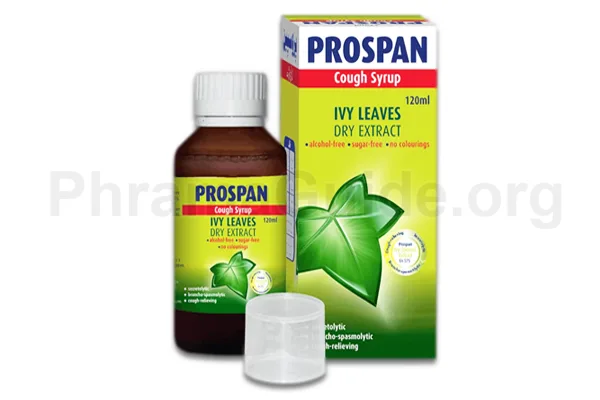Prospan syrup is derived from the leaves of the common ivy plant (Hedera helix). It has been used for various respiratory conditions and is primarily known for its expectorant properties. The following are some common uses and indications of Prospan Syrup:
- Cough Relief: Prospan syrup is commonly used to help alleviate cough symptoms, particularly in cases of acute bronchitis and chronic bronchitis. It can help thin and loosen mucus, making it easier to cough up and clear the airways.
- Expectorant: Prospan syrup has expectorant properties, which means it promotes the expulsion of mucus from the respiratory tract. It can help relieve congestion and facilitate easier breathing.
- Respiratory Support: Prospan syrup is used as a supportive treatment for respiratory conditions such as asthma, bronchitis, and chronic obstructive pulmonary disease (COPD). It may help reduce coughing, and wheezing, and improve overall respiratory function.
- Soothing Throat Irritation: The soothing properties of Prospan may help alleviate throat irritation and soreness associated with coughing and respiratory infections.
Off-label Uses of Prospan Syrup
- Asthma: Some individuals may use Prospan syrup as a complementary or alternative treatment for asthma symptoms. While there is limited scientific evidence supporting its efficacy for asthma, some people claim it helps reduce wheezing and improve breathing.
- Upper Respiratory Infections: Prospan syrup has been used off-label to alleviate symptoms of upper respiratory tract infections, such as congestion, sore throat, and coughing.
- Sinusitis: Prospan syrup may be used off-label to help relieve symptoms associated with sinusitis, such as nasal congestion and post-nasal drip.
- Allergic Rhinitis: There is limited evidence suggesting that Prospan may have anti-inflammatory properties that could potentially help alleviate symptoms of allergic rhinitides, such as sneezing, nasal congestion, and itchy or runny nose. However, more research is needed in this area.

What is Prospan?
Prospan Syrup is one of the leading brands of IVY Leaf Extract, manufactured and marketed by Highnoon Laboratories (Pvt) Ltd, Pakistan.
Prospan Alternatives : Ivy Leaf Extract Other Brands
The following are some alternative brands of Prospan Syrup and their manufacturer.
Samvy : Sami Pharmaceuticals (Pvt) Ltd, Pakistan.
Coferb : Hilton Pharmaceuticals (Pvt) Ltd, Pakistan.
Linkus : Herbion Pakistan (Pvt) Ltd.
Cufex : Neutrifactor Pakistan (Pvt) Ltd.
Cibcos-Ivy : Cibex (Pvt) Ltd, Pakistan.
Hylixia : Searle Pakistan (Pvt) Ltd.
Cofif : AGP Pharma (Pvt) Ltd, Pakistan.
Releaf : Nutris Laboratories, Pakistan.
Ivy Cough : SJ Herbal Laboratories, Pakistan.
Olcuf : Getz Pharmaceuticals (Pvt) Ltd, Pakistan.
Prospan : Available Formulations and Strengths
Presently, Prospan is available in Syrup form.
Prospan Syrup : Ivy Leaf Extract 35mg/5ml strength.
Who Should Not Use Prospan?
While Prospan Syrup is generally considered safe for most individuals when used as directed, there may be certain contraindications or precautions to consider.
Allergy or Sensitivity: Individuals with known allergies or sensitivities to ivy or other plants in the Araliaceae family may experience allergic reactions to ivy leaf extract. It is advisable to avoid Prospan if you have a known allergy to ivy or related plants.
Pregnancy and Breastfeeding: The safety of Prospan during pregnancy and breastfeeding has not been extensively studied. It is generally recommended to avoid using Prospan during these periods unless specifically advised by a healthcare professional.
Asthma: While Prospan is sometimes used as a complementary approach for asthma, it is important to consult with a healthcare professional before using it. Some individuals with asthma may be more prone to adverse reactions or bronchospasms when using Prospan. Proper asthma management should be in place, and the use of Prospan should be discussed with a healthcare professional.
Children: The safety and appropriate use of Prospan in children may vary depending on the age and specific circumstances. It is advisable to consult with a pediatrician before administering Prospan to children.
Drug Interactions: Prospan may interact with certain medications, potentially affecting their efficacy or increasing the risk of side effects. It is important to inform your healthcare professional about all the medications you are currently taking, including prescription drugs, over-the-counter medications, and herbal supplements, to avoid potential interactions.
Recommended Daily Dosage of Prospan Syrup
Prospan Syrup Dose for Adults and Children (over 12 years):
- 5 ml two to three times a day.
Prospan Syrup Dose for Children (2 to 5 years):
- 2 ml two times a day.
Prospan Syrup Dose for Children (6 to 11 years):
- 4 ml two times a day.
For Children, it is advised to use under the supervision of a Peditretion.
How Prospan Works?
The mode of action of Prospan is not fully understood, but it is believed to exert its effects through several mechanisms. Here are some potential modes of action associated with Prospan:
Expectorant Effects: Prospan is believed to have expectorant properties, meaning it helps promote the clearance of mucus from the airways. It is thought to facilitate the thinning and loosening of mucus, making it easier to cough up and expel.
Anti-inflammatory Activity: Prospan is suggested to possess anti-inflammatory properties. It may help reduce inflammation in the respiratory system, potentially relieving symptoms such as coughing, wheezing, and throat irritation.
Relaxation of Smooth Muscles: Prospan is thought to have a relaxant effect on smooth muscles, including those found in the respiratory system. This relaxation may help alleviate bronchial spasms and promote smoother breathing.
Anti-spasmodic Effects: Prospan may exert anti-spasmodic effects on the respiratory tract. It is believed to help reduce excessive coughing and soothe bronchial spasms, providing relief from cough symptoms.
Stimulation of Ciliary Movement: Prospan has been suggested to stimulate the cilia, tiny hair-like structures lining the respiratory tract. This stimulation may enhance the clearance of mucus and particles from the airways.

Leave A Comment